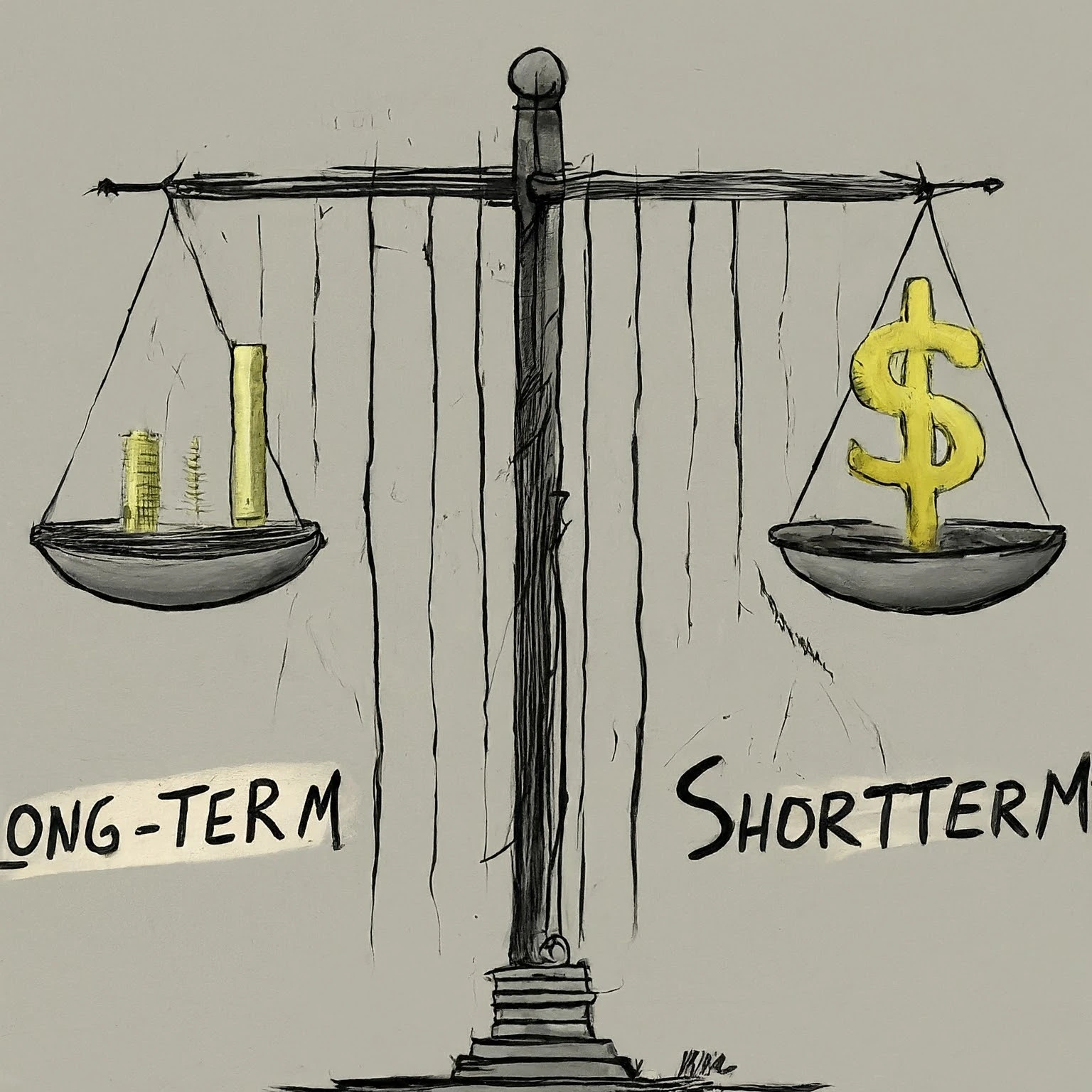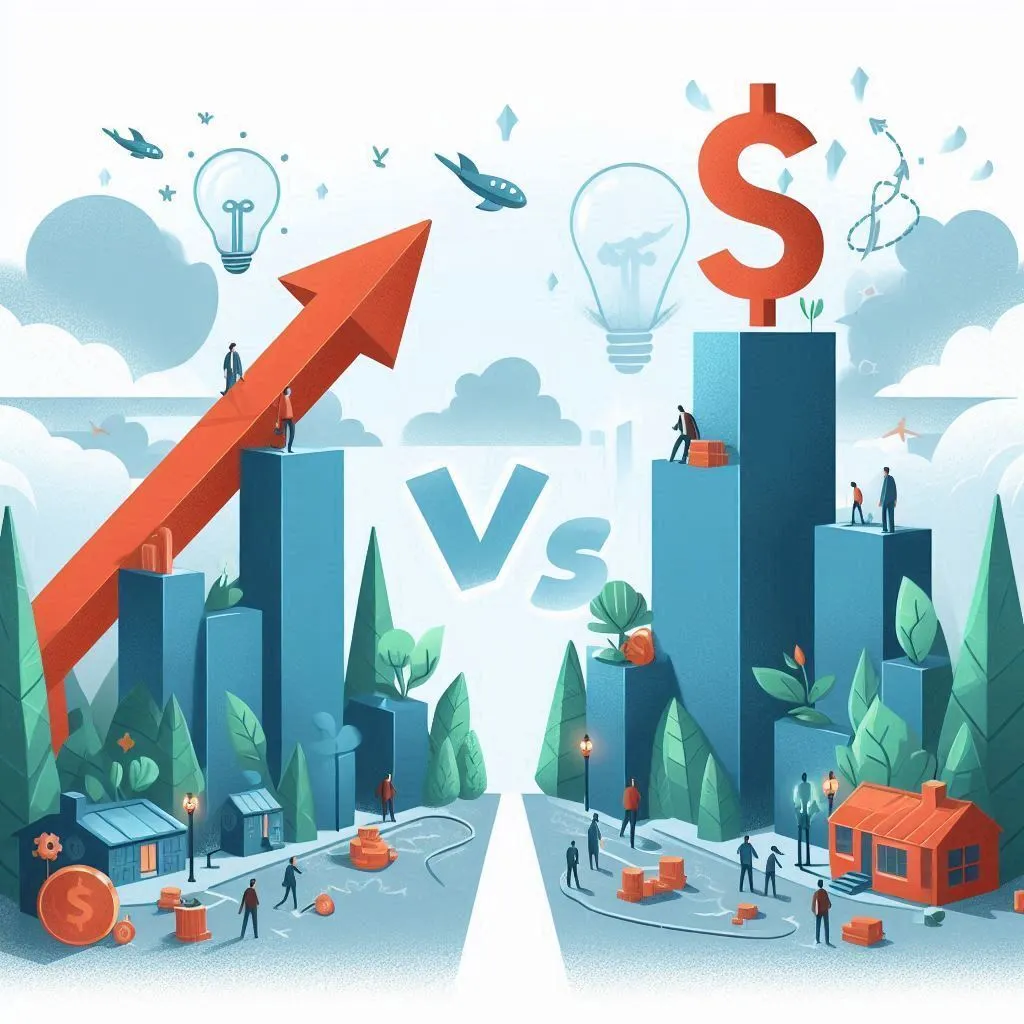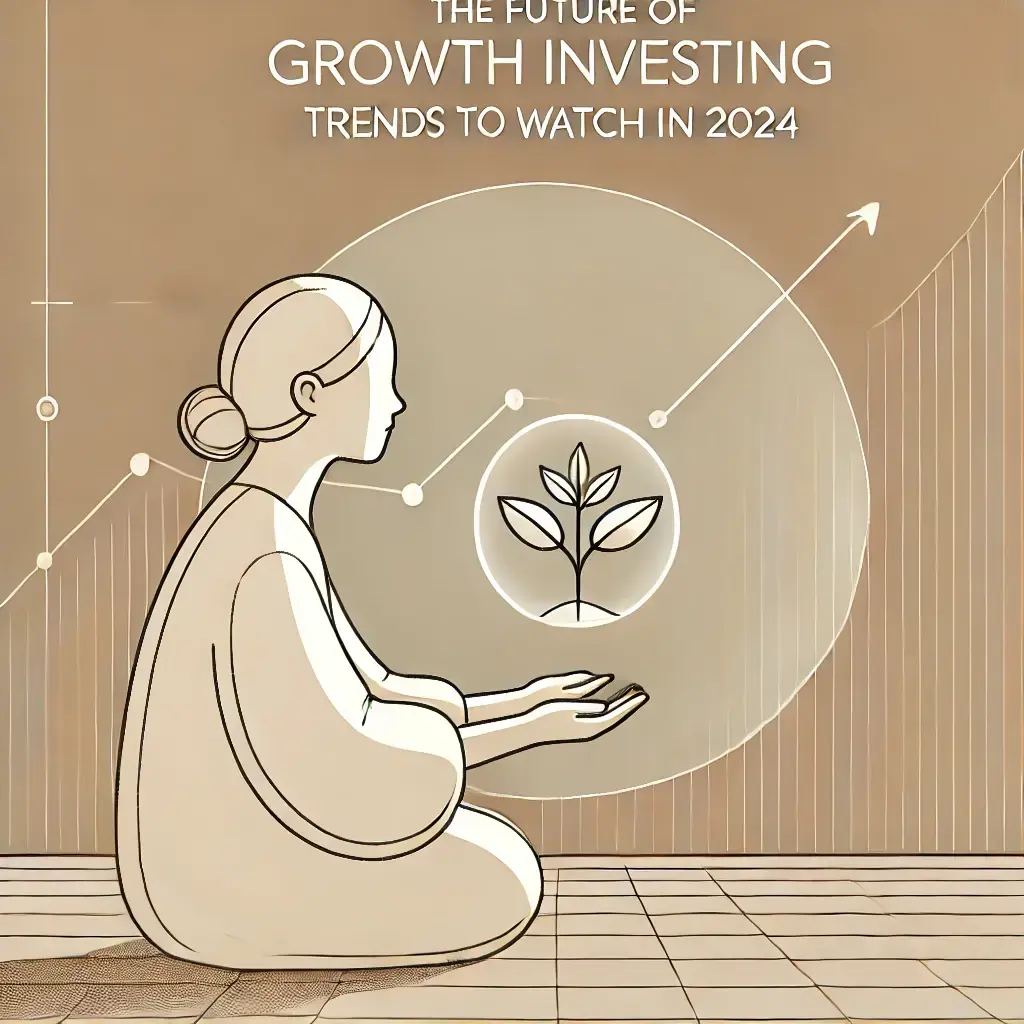
Growth Stocks
Growth stocks are shares of companies expected to grow at an above-average rate compared to other companies in the market. These companies typically reinvest their earnings into business expansion, innovation, and product development rather than paying out dividends. Growth stocks often belong to sectors with high potential, such as technology or healthcare, and are characterized by higher price-to-earnings (P/E) ratios. Investors are attracted to growth stocks for their potential to deliver significant capital appreciation over time, though they often come with higher risk and volatility compared to more stable, income-generating stocks.
Growth Stocks Guide



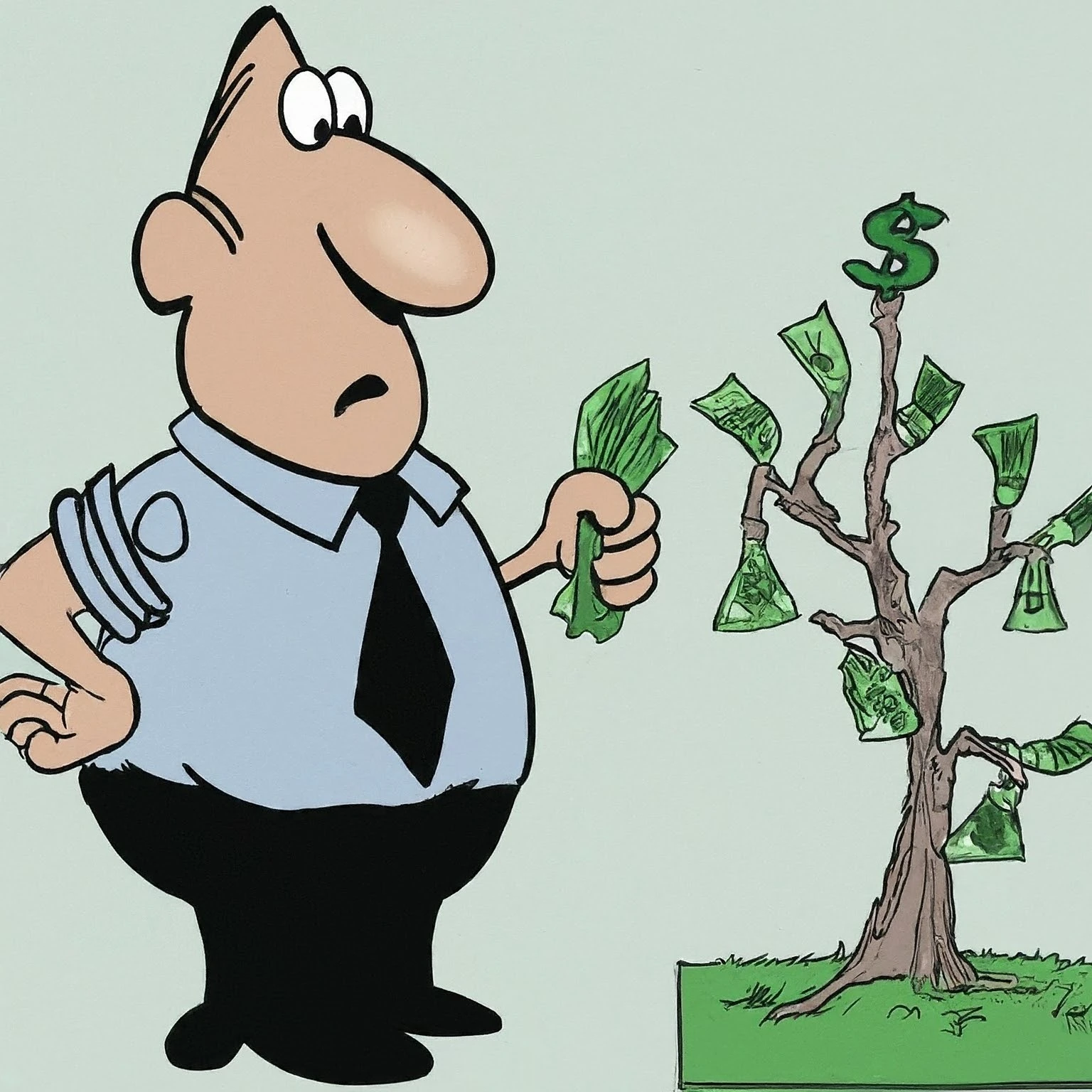
Growth Stocks Glossary
- Aggressive Growth(Noun)
- /uh-GRES-iv grohth/
- Definition: An investment strategy that seeks to achieve maximum capital appreciation by investing in high-risk, high-reward securities, often in volatile or emerging markets.
- Etymology: "Aggressive" from Latin "aggredi," meaning "to approach," and "growth" from Old English "growan," meaning "to increase." This term signifies a bold approach to investing with the aim of substantial financial gains.
- Similar: High-growth strategy
- Opposite: Conservative growth
- Example: "Investors with a high risk tolerance may pursue an aggressive growth strategy to maximize returns."
- Breakout Stocks(Noun)
- /BREYK-out stoks/
- Definition: Stocks that move above a significant resistance level or experience a rapid increase in price, often signaling the start of a strong upward trend.
- Etymology: "Breakout" from Old English "brecan," meaning "to break," and "stocks" from Old English "stocc," meaning "trunk" or "fund." This term refers to stocks that experience a significant upward movement, breaking past previous trading levels.
- Similar: Breakthrough stocks
- Opposite: Failing stocks
- Example: "Tech companies often produce breakout stocks that capture investor attention during earnings season."
- Capital Appreciation(Noun)
- /KAP-i-tuhl uh-pree-shee-AY-shun/
- Definition: The increase in the value of an investment or asset over time, reflecting the rise in market price compared to the original purchase price.
- Etymology: "Capital" from Latin "caput," meaning "head" or "money," and "appreciation" from Latin "appretiat," meaning "to value highly." This term describes the growth in value of an investment.
- Similar: Value increase
- Opposite: Capital depreciation
- Example: "Investors seek capital appreciation in growth stocks, aiming for substantial increases in stock value over time."
- Disruptive Innovation(Noun)
- /dis-RUHP-tiv in-uh-VEY-shun/
- Definition: Innovations that significantly alter or displace existing industries or markets by introducing groundbreaking products or services that change consumer behavior or business operations.
- Etymology: "Disruptive" from Latin "disrumpere," meaning "to break apart," and "innovation" from Latin "innovare," meaning "to renew." This term describes transformative changes that create new market opportunities while displacing established ones.
- Similar: Revolutionary innovation
- Opposite: Incremental innovation
- Example: "Companies that focus on disruptive innovation often become market leaders by redefining entire industries."
- Early-Stage Companies(Noun)
- /UR-lee stayj KUHM-puh-neez/
- Definition: Businesses in the initial phases of development, often characterized by high growth potential, yet also high risk due to the lack of a proven track record.
- Etymology: "Early" from Old English "ærlice," meaning "soon," "stage" from Latin "stagnum," meaning "standing place," and "companies" from Old French "compaignie," meaning "society." This term refers to new businesses that are in the initial phases of operation and growth.
- Similar: Startups
- Opposite: Mature companies
- Example: "Early-stage companies offer high reward potential, but they also come with significant risk for investors."
- Earnings Acceleration(Noun)
- /URN-ingz ak-sel-uh-RAY-shun/
- Definition: A rapid increase in a company's earnings growth rate, often seen as a positive indicator for future stock performance and investor confidence.
- Etymology: "Earnings" from Old English "earnian," meaning "to earn," and "acceleration" from Latin "acceleratio," meaning "to hasten." This term describes a scenario where a company’s earnings grow at an increasingly faster pace.
- Similar: Rapid earnings growth
- Opposite: Earnings deceleration
- Example: "The company’s earnings acceleration has made it a top pick among growth-focused investors."
- Earnings Growth Potential(Noun)
- /URN-ingz grohth puh-TEN-shuhl/
- Definition: The expected ability of a company to increase its earnings over time, often used as a key metric for evaluating growth stocks.
- Etymology: "Earnings" from Old English "earnian," meaning "to earn," "growth" from Old English "growan," meaning "to increase," and "potential" from Latin "potentialis," meaning "powerful." This term refers to the anticipated future increases in a company’s earnings.
- Similar: Earnings upside
- Opposite: Earnings decline potential
- Example: "Investors are attracted to the company’s strong earnings growth potential as it expands into new markets."
- Earnings Growth Rate(Noun)
- /URN-ingz grohth reyt/
- Definition: The percentage rate at which a company’s earnings are growing, often used to compare the growth prospects of different companies or sectors.
- Etymology: "Earnings" from Old English "earnian," meaning "to earn," "growth" from Old English "growan," meaning "to increase," and "rate" from Old French "rat," meaning "reckoning." This term describes how quickly a company’s earnings are increasing over time.
- Similar: Profit growth rate
- Opposite: Earnings contraction rate
- Example: "The earnings growth rate of the tech company outpaced its competitors, driving up its stock price."
- Earnings Multiple(Noun)
- /URN-ingz MUHL-tuh-puhl/
- Definition: A valuation metric calculated by dividing a company’s current share price by its earnings per share (EPS), often used to gauge whether a stock is overvalued or undervalued.
- Etymology: "Earnings" from Old English "earnian," meaning "to earn," and "multiple" from Latin "multiplicare," meaning "to increase." This term refers to the price-to-earnings (P/E) ratio used to value a company's stock.
- Similar: Price-to-earnings ratio
- Example: "Investors often look at the earnings multiple to determine if a stock is priced fairly relative to its earnings."
- Earnings Visibility(Noun)
- /URN-ingz viz-uh-BIL-i-tee/
- Definition: The clarity and predictability of a company’s future earnings, often influenced by stable revenue streams, strong market position, and consistent performance.
- Etymology: "Earnings" from Old English "earnian," meaning "to earn," and "visibility" from Latin "visibilis," meaning "that which can be seen." This term refers to how easily future earnings can be forecasted based on current operations and market conditions.
- Similar: Earnings predictability
- Opposite: Earnings uncertainty
- Example: "The company’s earnings visibility reassures investors, as it suggests stable financial performance."
- Emerging Markets(Noun)
- /ee-MUR-jing MAHR-kits/
- Definition: Countries or regions that are in the process of rapid growth and industrialization, offering investment opportunities with potentially higher returns but also higher risks.
- Etymology: "Emerging" from Latin "emergere," meaning "to rise out," and "markets" from Latin "mercatus," meaning "trade." This term refers to economies that are becoming more developed and integrated into the global market.
- Similar: Developing markets
- Opposite: Developed markets
- Example: "Investors looking for high growth potential often turn to emerging markets for diversification."
- Emerging Technology(Noun)
- /ee-MUR-jing tek-NOL-uh-jee/
- Definition: New and innovative technologies that are in the early stages of development or adoption, often associated with high growth potential and significant impacts on industries.
- Etymology: "Emerging" from Latin "emergere," meaning "to rise out," and "technology" from Greek "tekhnologia," meaning "systematic treatment." This term describes new technologies that have the potential to disrupt existing markets and create new ones.
- Similar: Cutting-edge technology
- Opposite: Established technology
- Example: "Investing in emerging technology can be highly rewarding, but it also carries considerable risk."
- Expansion Potential(Noun)
- /ik-SPAN-shun puh-TEN-shuhl/
- Definition: The ability of a company or industry to grow its operations, increase market share, or enter new markets, often driving future earnings growth.
- Etymology: "Expansion" from Latin "expandere," meaning "to spread out," and "potential" from Latin "potentialis," meaning "powerful." This term refers to the opportunities a company has to grow and develop further.
- Similar: Growth potential
- Opposite: Contraction risk
- Example: "The company’s expansion potential in international markets makes it an attractive investment for growth-focused investors."
- Expansion Strategy(Noun)
- /ik-SPAN-shun STRAT-uh-jee/
- Definition: A plan implemented by a company to grow its business, often through entering new markets, launching new products, or increasing capacity, with the goal of boosting revenue and profitability.
- Etymology: "Expansion" from Latin "expandere," meaning "to spread out," and "strategy" from Greek "strategia," meaning "generalship." This term refers to the methods a company uses to achieve growth.
- Similar: Growth strategy
- Opposite: Downsizing strategy
- Example: "The company’s expansion strategy focuses on penetrating new markets and scaling production."
- Fast-Growing Companies(Noun)
- /fast GROH-ing KUHM-puh-neez/
- Definition: Businesses that experience rapid increases in revenue, market share, or earnings, often seen as high-potential investments in growth-oriented sectors.
- Etymology: "Fast" from Old English "fæst," meaning "firmly fixed," and "growing" from Old English "growan," meaning "to increase." This term describes companies that expand their operations and financial performance quickly.
- Similar: Rapid-growth companies
- Opposite: Slow-growing companies
- Example: "Fast-growing companies in the tech sector are attracting significant attention from venture capitalists."
- Future Earnings(Noun)
- /FYOO-chur URN-ingz/
- Definition: The anticipated profits a company is expected to generate in the future, often used as a basis for valuing stocks, especially in growth-oriented investing.
- Etymology: "Future" from Latin "futurus," meaning "about to be," and "earnings" from Old English "earnian," meaning "to earn." This term refers to the profits a company is expected to generate going forward.
- Similar: Projected earnings
- Opposite: Historical earnings
- Example: "Investors are buying the stock based on the company’s strong future earnings potential."
- Growth ETF(Noun)
- /GROH-th E-T-F/
- Definition: An Exchange-Traded Fund that focuses on investing in growth stocks, which are companies expected to grow at an above-average rate compared to other companies or the overall market.
- Etymology: "Growth" from Old English "growan," meaning "to increase," and "ETF" stands for Exchange-Traded Fund, a type of investment fund traded on stock exchanges. This term refers to a fund that specifically targets high-growth companies.
- Similar: Growth-focused ETF
- Opposite: Value ETF
- Example: "A Growth ETF offers investors diversified exposure to companies with strong earnings growth potential."
- Growth Fund(Noun)
- /GROH-th fuhnd/
- Definition: A mutual fund or ETF that primarily invests in stocks of companies expected to grow at an above-average rate compared to other sectors or the overall market, focusing on capital appreciation rather than income.
- Etymology: "Growth" from Old English "growan," meaning "to increase," and "fund" from Old English "fand," meaning "to provide." This term refers to an investment vehicle focused on growing capital through investments in growth stocks.
- Similar: Growth-oriented fund
- Opposite: Income fund
- Example: "Investors looking for capital appreciation may choose a growth fund to benefit from potential stock price increases."
- Growth Industry(Noun)
- /GROH-th IN-duh-stree/
- Definition: A sector of the economy that is experiencing a higher-than-average growth rate compared to other sectors, often driven by innovation, increasing demand, or emerging technologies.
- Etymology: "Growth" from Old English "growan," meaning "to increase," and "industry" from Latin "industria," meaning "diligence." This term refers to industries that are expanding rapidly, offering significant investment opportunities.
- Similar: Expanding sector
- Opposite: Declining industry
- Example: "The renewable energy sector is considered a growth industry due to the increasing demand for sustainable power sources."
- Growth Metrics(Noun)
- /GROH-th MET-riks/
- Definition: Quantitative measures used to assess a company’s growth performance, such as revenue growth, earnings growth, and profit margins, which are key indicators for evaluating growth stocks.
- Etymology: "Growth" from Old English "growan," meaning "to increase," and "metrics" from Greek "metron," meaning "measure." This term refers to the data points used to evaluate a company’s expansion and financial performance.
- Similar: Growth indicators
- Opposite: Decline metrics
- Example: "Analysts use growth metrics to identify companies that are outperforming their peers in terms of expansion."
- Growth Opportunities(Noun)
- /GROH-th op-er-TOO-ni-teez/
- Definition: Potential avenues or prospects for a company or industry to expand its business, increase market share, or enhance profitability, often through new products, markets, or innovations.
- Etymology: "Growth" from Old English "growan," meaning "to increase," and "opportunities" from Latin "opportunitas," meaning "favorableness." This term describes potential for expansion and development in a business context.
- Similar: Expansion opportunities
- Opposite: Shrinking opportunities
- Example: "Investors are particularly interested in companies with strong growth opportunities in emerging markets."
- Growth Premium(Noun)
- /GROH-th PREE-mee-uhm/
- Definition: The higher valuation or price that investors are willing to pay for a stock based on its expected future growth in earnings or revenue, often reflected in higher P/E ratios.
- Etymology: "Growth" from Old English "growan," meaning "to increase," and "premium" from Latin "praemium," meaning "reward." This term refers to the additional cost investors are willing to pay for stocks with high growth potential.
- Similar: Growth valuation
- Opposite: Value discount
- Example: "Investors may accept a growth premium for a stock with strong earnings projections and a promising market position."
- Growth Stock Fund(Noun)
- /GROH-th stok fuhnd/
- Definition: A type of mutual fund or ETF that invests primarily in growth stocks, aiming to achieve high capital appreciation by targeting companies with strong earnings growth potential.
- Etymology: "Growth" from Old English "growan," meaning "to increase," "stock" from Old English "stocc," meaning "fund," and "fund" from Old English "fand," meaning "to provide." This term describes a fund that focuses on investing in companies expected to grow rapidly.
- Similar: Growth equity fund
- Opposite: Value stock fund
- Example: "A growth stock fund is ideal for investors seeking high returns through investments in fast-growing companies."
- Growth Story(Noun)
- /GROH-th STOR-ee/
- Definition: A narrative or explanation that highlights a company’s potential for significant future growth, often used to attract investors by emphasizing strong market opportunities and business expansion plans.
- Etymology: "Growth" from Old English "growan," meaning "to increase," and "story" from Old English "storie," meaning "narrative." This term refers to the compelling aspects of a company’s business model that suggest it will grow substantially in the future.
- Similar: Growth narrative
- Opposite: Decline story
- Example: "The company’s growth story, centered around its innovative products, has attracted significant investor interest."
- Growth Trajectory(Noun)
- /GROH-th truh-JEK-tuh-ree/
- Definition: The path or direction of a company’s growth over time, often measured by metrics such as revenue or earnings, indicating whether the company is expanding, stagnating, or declining.
- Etymology: "Growth" from Old English "growan," meaning "to increase," and "trajectory" from Latin "trajectoria," meaning "throw across." This term describes the direction and pace of a company’s development and expansion.
- Similar: Growth path
- Opposite: Decline trajectory
- Example: "The company’s growth trajectory has been steadily upward, driven by strong sales and market expansion."
- Growth-Oriented Companies(Noun)
- /GROH-th AWR-ee-en-tid KUHM-puh-neez/
- Definition: Businesses that focus on expanding their operations, increasing revenues, and enhancing profitability, often through innovation, market penetration, and reinvestment in their own growth.
- Etymology: "Growth" from Old English "growan," meaning "to increase," "oriented" from Latin "orientem," meaning "to rise," and "companies" from Old French "compaignie," meaning "society." This term describes companies that prioritize growth in their business strategies.
- Similar: Growth-focused companies
- Opposite: Income-oriented companies
- Example: "Growth-oriented companies are often valued for their potential to deliver substantial returns to investors."
- Healthcare Sector(Noun)
- /HELTH-kair SEK-tur/
- Definition: The segment of the economy that provides goods and services related to medical care, pharmaceuticals, health insurance, and medical devices, often considered a growth sector due to increasing demand.
- Etymology: "Health" from Old English "haelth," meaning "wholeness," and "care" from Old English "caru," meaning "attention." "Sector" from Latin "sectio," meaning "cutting," refers to a distinct part of the economy.
- Similar: Medical sector
- Example: "The healthcare sector is expected to grow rapidly as populations age and demand for medical services increases."
- High Beta(Noun)
- /hye BAY-tuh/
- Definition: A measure of a stock’s volatility compared to the overall market, where a beta greater than 1 indicates the stock is more volatile than the market, often associated with higher risk and higher potential returns.
- Etymology: "High" from Old English "heah," meaning "tall," and "beta" from the Greek letter "beta," used in finance to denote risk relative to the market. This term indicates a stock’s sensitivity to market movements.
- Similar: High-volatility
- Opposite: Low beta
- Example: "Investors seeking high returns may gravitate toward high beta stocks, despite their increased risk."
- High Beta Stocks(Noun)
- /hye BAY-tuh stoks/
- Definition: Stocks with a beta greater than 1, meaning they are more volatile than the overall market, potentially offering higher returns but also carrying higher risk.
- Etymology: "High" from Old English "heah," meaning "tall," "beta" from Greek "beta," representing market volatility, and "stocks" from Old English "stocc," meaning "trunk" or "fund." This term refers to stocks that tend to move more sharply than the broader market.
- Similar: High-volatility stocks
- Opposite: Low beta stocks
- Example: "High beta stocks are often favored by investors looking to capitalize on strong market movements."
- High Growth Potential(Noun)
- /hye grohth puh-TEN-shuhl/
- Definition: The likelihood that a company or investment will experience significant growth in revenue, earnings, or market share, often attracting investors seeking high returns.
- Etymology: "High" from Old English "heah," meaning "tall," "growth" from Old English "growan," meaning "to increase," and "potential" from Latin "potentialis," meaning "powerful." This term indicates a strong possibility for substantial future expansion.
- Similar: Strong growth prospects
- Opposite: Low growth potential
- Example: "The startup has high growth potential, making it an attractive investment for venture capitalists."
- High Growth Rate(Noun)
- /hye grohth reyt/
- Definition: A rapid increase in a company’s revenue, earnings, or market share over a specific period, indicating strong performance and often leading to higher stock valuations.
- Etymology: "High" from Old English "heah," meaning "tall," "growth" from Old English "growan," meaning "to increase," and "rate" from Old French "rat," meaning "reckoning." This term refers to the speed at which a company or sector is expanding.
- Similar: Rapid growth
- Opposite: Low growth rate
- Example: "The company’s high growth rate has attracted significant attention from growth-oriented investors."
- High Growth Sectors(Noun)
- /hye grohth SEK-turz/
- Definition: Industries or segments of the economy that are expanding rapidly and are expected to continue growing at an above-average rate compared to other sectors.
- Etymology: "High" from Old English "heah," meaning "tall," "growth" from Old English "growan," meaning "to increase," and "sectors" from Latin "sectio," meaning "cutting." This term refers to areas of the economy that are experiencing rapid expansion.
- Similar: Fast-growing industries
- Opposite: Low growth sectors
- Example: "High growth sectors like technology and healthcare are often targets for aggressive investors seeking strong returns."
- High P/E Growth(Noun)
- /hahy P-E grohth/
- Definition: Refers to stocks that have a high price-to-earnings (P/E) ratio due to investors’ expectations of significant earnings growth in the future.
- Etymology: "High" from Old English "heah," "P/E" stands for price-to-earnings, and "growth" from Old English "growan," meaning "to increase." This term indicates stocks with high valuation multiples because of anticipated rapid growth.
- Similar: High-growth P/E
- Opposite: Low P/E growth
- Example: "Investors in high P/E growth stocks are betting on continued strong earnings performance."
- High P/E Ratio(Noun)
- /hahy P-E rey-shoh/
- Definition: A valuation metric where a stock's price is high relative to its earnings per share (EPS), often indicating that investors expect high future growth.
- Etymology: "High" from Old English "heah," "P/E" from "price-to-earnings," and "ratio" from Latin "ration," meaning "reckoning." This term reflects a high valuation compared to current earnings.
- Similar: Elevated P/E
- Opposite: Low P/E ratio
- Example: "Companies in the tech sector often have a high P/E ratio due to expectations of future growth."
- High P/E Stocks(Noun)
- /hahy P-E stoks/
- Definition: Stocks that trade at a high price-to-earnings (P/E) ratio, usually because investors expect significant future earnings growth.
- Etymology: "High" from Old English "heah," "P/E" from "price-to-earnings," and "stocks" from Old English "stocc," meaning "fund." This term refers to equities with high valuation multiples based on future growth expectations.
- Similar: Growth stocks
- Opposite: Low P/E stocks
- Example: "High P/E stocks can be risky, as they require continued earnings growth to justify their valuations."
- High Return Potential(Noun)
- /hahy ri-TURN puh-TEN-shuhl/
- Definition: The possibility that an investment could generate significant returns, often associated with high-risk, high-reward scenarios in growth stocks.
- Etymology: "High" from Old English "heah," "return" from Old French "retourner," meaning "to turn back," and "potential" from Latin "potentialis," meaning "powerful." This term suggests the likelihood of substantial gains from an investment.
- Similar: High-profit potential
- Opposite: Low return potential
- Example: "Investing in emerging markets offers high return potential but comes with greater risks."
- High Revenue Multiples(Noun)
- /hahy REV-uh-noo muhl-ti-puhls/
- Definition: A valuation measure where a company’s stock is priced at a high multiple of its revenue, reflecting investor expectations of strong future growth.
- Etymology: "High" from Old English "heah," "revenue" from Old French "revenue," meaning "return," and "multiples" from Latin "multiplicare," meaning "to increase." This term reflects a high valuation relative to a company's revenue.
- Similar: Elevated revenue multiples
- Opposite: Low revenue multiples
- Example: "Tech companies often trade at high revenue multiples due to their potential for rapid growth."
- High Valuation(Noun)
- /hahy val-yoo-AY-shun/
- Definition: The state of a stock being priced higher than average relative to financial metrics like earnings, revenue, or book value, usually due to strong growth expectations.
- Etymology: "High" from Old English "heah," and "valuation" from Latin "valere," meaning "to be strong." This term describes a scenario where a stock or company is considered to have a high market value.
- Similar: Premium valuation
- Opposite: Low valuation
- Example: "Investors are willing to pay a high valuation for companies with dominant market positions and growth prospects."
- High Valuation Multiples(Noun)
- /hahy val-yoo-AY-shun muhl-ti-puhls/
- Definition: The pricing of a stock at high multiples of earnings, revenue, or book value, indicating that investors expect significant future growth or profitability.
- Etymology: "High" from Old English "heah," "valuation" from Latin "valere," meaning "to be strong," and "multiples" from Latin "multiplicare," meaning "to increase." This term refers to stocks valued at high multiples of their financial metrics.
- Similar: High valuation ratios
- Opposite: Low valuation multiples
- Example: "High valuation multiples can be justified by strong growth trajectories, but they also increase the risk if growth slows."
- Hyper-Growth(Noun)
- /HAHY-per grohth/
- Definition: Extremely rapid growth, typically far exceeding the average in the industry or market, often seen in early-stage companies or those introducing groundbreaking products.
- Etymology: "Hyper" from Greek "hyper," meaning "over," and "growth" from Old English "growan," meaning "to increase." This term describes companies experiencing very rapid expansion, often in revenue or market share.
- Similar: Exponential growth
- Opposite: Moderate growth
- Example: "The startup's hyper-growth phase attracted significant venture capital investment."
- Innovation(Noun)
- /in-uh-VEY-shun/
- Definition: The process of introducing new ideas, products, or methods that significantly enhance or change the market, often driving growth in companies and industries.
- Etymology: "Innovation" from Latin "innovare," meaning "to renew or alter." This term refers to the creation and implementation of new technologies or processes that disrupt markets and drive growth.
- Similar: Advancement
- Opposite: Stagnation
- Example: "Continuous innovation is key to maintaining a competitive edge in the tech industry."
- Innovation Pipeline(Noun)
- /in-uh-VEY-shun PAHYPL-ahyn/
- Definition: A company’s portfolio of potential new products, services, or technologies that are in development and expected to drive future growth.
- Etymology: "Innovation" from Latin "innovare," meaning "to renew," and "pipeline" from the literal term for a conduit, here used metaphorically to describe the flow of new ideas or products.
- Similar: Development pipeline
- Opposite: Product backlog
- Example: "The company’s robust innovation pipeline promises to sustain its growth for years to come."
- IPO Stocks(Noun)
- /I-P-O stoks/
- Definition: Stocks of companies that have recently gone public through an Initial Public Offering (IPO), often associated with high volatility and growth potential.
- Etymology: "IPO" stands for Initial Public Offering, and "stocks" from Old English "stocc," meaning "fund." This term refers to shares in companies that are newly available to the public market.
- Similar: Newly public stocks
- Opposite: Established stocks
- Example: "Investors often seek IPO stocks for their potential high returns, though they come with increased risk."
- Large Cap Growth(Noun)
- /lahrj kap grohth/
- Definition: Investment in large-cap companies (with a market capitalization of $10 billion or more) that are expected to grow faster than the overall market, typically offering both stability and growth potential.
- Etymology: "Large" from Old English "lare," meaning "great," "cap" from "capitalization," and "growth" from Old English "growan," meaning "to increase." This term refers to growth-oriented investments in large, established companies.
- Similar: Big-cap growth
- Opposite: Small-cap value
- Example: "Large cap growth stocks are often sought by investors looking for a balance of growth and stability."
- Market Disruption(Noun)
- /MAHR-kit dis-RUHP-shun/
- Definition: Significant changes in an industry caused by new technologies, business models, or regulations that challenge the status quo, often creating opportunities for new market leaders.
- Etymology: "Market" from Latin "mercatus," meaning "trade," and "disruption" from Latin "disrumpere," meaning "to break apart." This term refers to changes that fundamentally alter market dynamics.
- Similar: Market upheaval
- Opposite: Market stability
- Example: "The introduction of smartphones caused significant market disruption in the tech industry."
- Market Dominance(Noun)
- /MAHR-kit DOM-uh-nuhns/
- Definition: The ability of a company or product to control a large portion of the market share within its industry, often leading to increased pricing power and profitability.
- Etymology: "Market" from Latin "mercatus," meaning "trade," and "dominance" from Latin "dominantia," meaning "rule or control." This term refers to the commanding position of a company in its market.
- Similar: Market leadership
- Opposite: Market follower
- Example: "Amazon's market dominance in e-commerce allows it to set trends and influence consumer behavior."
- Market Expectations(Noun)
- /MAHR-kit eks-pek-TAY-shuhns/
- Definition: The collective outlook of investors and analysts regarding future market performance, including earnings, economic indicators, and stock prices, which often drive market movements.
- Etymology: "Market" from Latin "mercatus," meaning "trade," and "expectations" from Latin "expectatio," meaning "anticipation." This term refers to the anticipated outcomes or performance of markets as forecasted by investors and analysts.
- Similar: Market outlook
- Opposite: Market uncertainty
- Example: "When actual earnings surpass market expectations, stock prices typically rise."
- Market Growth(Noun)
- /MAHR-kit grohth/
- Definition: The increase in the size or value of a market over time, driven by factors such as rising demand, new technologies, or economic expansion.
- Etymology: "Market" from Latin "mercatus," meaning "trade," and "growth" from Old English "growan," meaning "to increase." This term refers to the expansion of a market’s size or revenue potential.
- Similar: Market expansion
- Opposite: Market contraction
- Example: "The market growth in renewable energy has attracted significant investment."
- Market Leaders(Noun)
- /MAHR-kit LEE-durz/
- Definition: Companies that hold the largest market share in their industry, often setting benchmarks for performance, innovation, and pricing.
- Etymology: "Market" from Latin "mercatus," meaning "trade," and "leaders" from Old English "lædan," meaning "to lead." This term refers to dominant companies that guide the direction of their respective industries.
- Similar: Industry leaders
- Opposite: Market laggards
- Example: "Market leaders like Apple and Microsoft continue to drive innovation in the technology sector."
- Market Opportunity(Noun)
- /MAHR-kit op-er-TOO-ni-tee/
- Definition: A favorable situation in the market that allows a company to expand its business or capitalize on a growing demand, often leading to increased revenue and market share.
- Etymology: "Market" from Latin "mercatus," meaning "trade," and "opportunity" from Latin "opportunitas," meaning "favorable." This term refers to chances for companies to exploit changes or trends in the market for growth.
- Similar: Market potential
- Opposite: Market threat
- Example: "The rise of e-commerce presented a major market opportunity for logistics companies."
- Market Penetration(Noun)
- /MAHR-kit pen-i-TRAY-shun/
- Definition: The extent to which a product or service is adopted by customers in a specific market, often measured as a percentage of the total potential market.
- Etymology: "Market" from Latin "mercatus," meaning "trade," and "penetration" from Latin "penetrationem," meaning "a putting or getting into." This term refers to the success of a product in capturing market share.
- Similar: Market share capture
- Opposite: Market exit
- Example: "The company’s strong market penetration strategy helped it dominate the smartphone market."
- Market Share Growth(Noun)
- /MAHR-kit shair grohth/
- Definition: The increase in the percentage of a market that a company’s product or service controls, often a key indicator of competitive success.
- Etymology: "Market" from Latin "mercatus," meaning "trade," "share" from Old English "scearu," meaning "portion," and "growth" from Old English "growan," meaning "to increase." This term refers to the expansion of a company's dominance in a market.
- Similar: Market share expansion
- Opposite: Market share decline
- Example: "Achieving market share growth in a competitive industry often requires innovative products and aggressive marketing."
- Mid Cap Growth(Noun)
- /mid kap grohth/
- Definition: Investments in mid-cap companies, which typically have a market capitalization between $2 billion and $10 billion, that are expected to grow at a faster rate than the overall market.
- Etymology: "Mid" from Old English "mid," meaning "middle," "cap" from "capitalization," and "growth" from Old English "growan," meaning "to increase." This term refers to growth-oriented investments in mid-sized companies.
- Similar: Medium-cap growth
- Opposite: Large-cap growth
- Example: "Mid cap growth stocks are appealing to investors seeking higher returns without the risks associated with small-cap stocks."
- New Product Launch(Noun)
- /noo prod-uhkt lawnch/
- Definition: The introduction of a new product to the market, often involving significant marketing and sales efforts, and seen as a critical driver of growth for companies.
- Etymology: "New" from Old English "niwe," meaning "recently made," "product" from Latin "productum," meaning "thing produced," and "launch" from Old French "lancier," meaning "to hurl or release." This term refers to the debut of a new product in the market.
- Similar: Product introduction
- Opposite: Product discontinuation
- Example: "The company’s new product launch was highly anticipated, driving up its stock price ahead of the release."
- Next-Generation Technology(Noun)
- /nekst jen-uh-RAY-shun tek-NOL-uh-jee/
- Definition: Advanced technology that represents a significant leap forward from existing solutions, often providing greater efficiency, functionality, or new capabilities.
- Etymology: "Next" from Old English "nexte," meaning "nearest in order," "generation" from Latin "generatio," meaning "production," and "technology" from Greek "tekhnologia," meaning "systematic treatment." This term refers to cutting-edge technological advancements.
- Similar: Advanced technology
- Opposite: Legacy technology
- Example: "Investors are keen on companies that are leaders in next-generation technology, such as artificial intelligence."
- Price Performance(Noun)
- /prahys per-FORM-uhns/
- Definition: The movement of a stock’s price over a given period, reflecting how well the stock has performed in the market compared to benchmarks or expectations.
- Etymology: "Price" from Old French "pris," meaning "value," and "performance" from Old French "parformance," meaning "accomplishment." This term refers to how a stock’s price has changed over time.
- Similar: Stock performance
- Opposite: Price stagnation
- Example: "The company’s strong price performance over the last quarter has made it a favorite among growth investors."
- Price-to-Earnings Expansion(Noun)
- /prahys-tuh-UR-ningz ik-SPAN-shun/
- Definition: The increase in a company’s price-to-earnings (P/E) ratio, often due to higher investor expectations for future growth or improved earnings prospects.
- Etymology: "Price" from Old French "pris," "earnings" from Old English "earnian," and "expansion" from Latin "expandere," meaning "to spread out." This term refers to the growth in a company’s P/E ratio.
- Similar: P/E ratio expansion
- Opposite: P/E compression
- Example: "Investors are expecting price-to-earnings expansion as the company rolls out its new product line."
- Product Development(Noun)
- /prod-uhkt dih-VEL-uhp-muhnt/
- Definition: The process of creating, designing, and bringing a new product to market, often a key component of a company’s growth strategy.
- Etymology: "Product" from Latin "productum," meaning "thing produced," and "development" from Old French "desveloper," meaning "to wrap or envelop." This term refers to the stages of bringing a new product from concept to market readiness.
- Similar: Product creation
- Opposite: Product obsolescence
- Example: "Strong product development is crucial for companies aiming to maintain a competitive edge in fast-paced industries."
- Product Innovation(Noun)
- /prod-uhkt in-uh-VEY-shun/
- Definition: The introduction of new or significantly improved products to meet consumer demands or open up new markets, often a driving force behind company growth.
- Etymology: "Product" from Latin "productum," meaning "thing produced," and "innovation" from Latin "innovare," meaning "to renew." This term refers to the creation of new products or enhancements to existing ones that drive market success.
- Similar: Product advancement
- Opposite: Product stagnation
- Example: "Product innovation has allowed the company to capture a larger share of the market and stay ahead of competitors."
- Rapid Expansion(Noun)
- /RAP-id ik-SPAN-shun/
- Definition: The quick and widespread growth of a company’s operations, market presence, or product offerings, often driven by increased demand or strategic initiatives.
- Etymology: "Rapid" from Latin "rapidus," meaning "seizing quickly," and "expansion" from Latin "expandere," meaning "to spread out." This term describes swift growth in a company's size or scope.
- Similar: Fast growth
- Opposite: Slow expansion
- Example: "The company’s rapid expansion into international markets has fueled its stock price surge."
- Rapid Growth(Noun)
- /RAP-id grohth/
- Definition: The accelerated increase in a company’s size, revenue, or market share over a short period, often indicating strong performance and high investor interest.
- Etymology: "Rapid" from Latin "rapidus," meaning "seizing quickly," and "growth" from Old English "growan," meaning "to increase." This term refers to a swift rise in a company's key metrics.
- Similar: Accelerated growth
- Opposite: Gradual growth
- Example: "The startup's rapid growth has made it one of the hottest stocks in the tech sector."
- Reinvestment(Noun)
- /ree-in-VEST-muhnt/
- Definition: The act of using earnings or returns from investments to purchase more assets or fund business activities, often to fuel further growth.
- Etymology: "Reinvestment" from Latin "re," meaning "again," and "investment" from Old French "investir," meaning "to clothe" or "surround." This term describes putting earnings back into investments or business operations for continued growth.
- Similar: Plowing back
- Opposite: Divestment
- Example: "The company’s strategy of reinvestment has allowed it to continually grow its revenue and market share."
- Revenue Acceleration(Noun)
- /REV-uh-noo ak-sel-uh-RAY-shun/
- Definition: The increase in the rate at which a company’s revenue is growing, often a sign of strong business performance and a key indicator for growth investors.
- Etymology: "Revenue" from Old French "revenue," meaning "return," and "acceleration" from Latin "acceleratio," meaning "to hasten." This term refers to the quickening pace of revenue growth.
- Similar: Revenue growth acceleration
- Opposite: Revenue deceleration
- Example: "The company’s revenue acceleration in the last quarter has drawn increased attention from growth-focused investors."
- Revenue Expansion(Noun)
- /REV-uh-noo ik-SPAN-shun/
- Definition: The broadening of a company’s revenue base, either by increasing sales of existing products, introducing new products, or entering new markets.
- Etymology: "Revenue" from Old French "revenue," meaning "return," and "expansion" from Latin "expandere," meaning "to spread out." This term refers to the growth in a company's revenue streams.
- Similar: Revenue growth
- Opposite: Revenue contraction
- Example: "Revenue expansion in emerging markets has significantly boosted the company’s overall financial performance."
- Revenue Forecast(Noun)
- /REV-uh-noo FOR-kast/
- Definition: A projection of the future revenue a company expects to generate, based on factors such as market conditions, sales trends, and economic indicators.
- Etymology: "Revenue" from Old French "revenue," meaning "return," and "forecast" from Old English "fore," meaning "before," and "casten," meaning "to throw." This term refers to the anticipated future earnings of a company.
- Similar: Revenue projection
- Opposite: Revenue uncertainty
- Example: "Analysts were optimistic about the company’s revenue forecast for the upcoming fiscal year."
- Revenue Growth Rate(Noun)
- /REV-uh-noo grohth reyt/
- Definition: The percentage increase in a company’s revenue over a specified period, often used to assess the company’s financial health and growth potential.
- Etymology: "Revenue" from Old French "revenue," meaning "return," "growth" from Old English "growan," meaning "to increase," and "rate" from Latin "ratio," meaning "reckoning." This term measures how quickly a company's revenue is increasing.
- Similar: Sales growth rate
- Opposite: Revenue decline rate
- Example: "The company’s strong revenue growth rate has made it a top pick among growth investors."
- Revenue Multiple(Noun)
- /REV-uh-noo muhl-ti-puhl/
- Definition: A valuation measure that compares a company’s market capitalization to its revenue, often used to assess whether a stock is overvalued or undervalued relative to its sales.
- Etymology: "Revenue" from Old French "revenue," meaning "return," and "multiple" from Latin "multiplicare," meaning "to increase." This term evaluates a company’s market value relative to its revenue.
- Similar: Price-to-sales ratio
- Opposite: Earnings multiple
- Example: "Investors use the revenue multiple to gauge the valuation of companies with high sales but low profits."
- Revenue Projections(Noun)
- /REV-uh-noo pruh-JEK-shuhns/
- Definition: Estimates of the amount of revenue a company is expected to generate in future periods, based on various assumptions about sales, market conditions, and business strategy.
- Etymology: "Revenue" from Old French "revenue," meaning "return," and "projections" from Latin "proicere," meaning "to throw forth." This term refers to anticipated future earnings based on current data and trends.
- Similar: Sales projections
- Opposite: Revenue history
- Example: "The company’s revenue projections for the next quarter are optimistic, reflecting strong market demand."
- Revenue Streams(Noun)
- /REV-uh-noo streemz/
- Definition: The various sources of income a company generates, such as product sales, service fees, subscriptions, or licensing, often used to assess the diversity and stability of a company’s income.
- Etymology: "Revenue" from Old French "revenue," meaning "return," and "streams" from Old English "stream," meaning "a river or current." This term refers to the different ways a company makes money.
- Similar: Income sources
- Opposite: Revenue void
- Example: "Diversifying revenue streams has helped the company maintain steady growth despite market volatility."
- Revenue Visibility(Noun)
- /REV-uh-noo viz-uh-BIL-i-tee/
- Definition: The clarity and predictability of a company’s future revenue, often based on factors like recurring sales, long-term contracts, or stable customer demand.
- Etymology: "Revenue" from Old French "revenue," meaning "return," and "visibility" from Latin "visibilis," meaning "able to be seen." This term describes the ability to forecast a company’s revenue with confidence.
- Similar: Revenue predictability
- Opposite: Revenue uncertainty
- Example: "High revenue visibility in the subscription business model reassures investors of consistent cash flow."
- Sales Expansion(Noun)
- /saylz ik-SPAN-shun/
- Definition: The growth of a company’s sales, often through strategies like market penetration, product development, or entering new markets, aimed at increasing revenue and market share.
- Etymology: "Sales" from Old English "salan," meaning "to give or sell," and "expansion" from Latin "expandere," meaning "to spread out." This term refers to the increase in the volume or scope of a company’s sales activities.
- Similar: Sales growth
- Opposite: Sales contraction
- Example: "The company’s aggressive sales expansion strategy in Asia has significantly boosted its global market share."
- Scalability(Noun)
- /skay-luh-BIL-i-tee/
- Definition: The capacity of a business to grow and manage increased demand effectively without compromising performance or losing profitability, often a key factor in assessing growth potential.
- Etymology: "Scalability" from "scale," meaning "a graduated range" (from Latin "scala," meaning "ladder"), and "-ability," meaning "capacity." This term refers to a business’s ability to handle growth smoothly.
- Similar: Expandability
- Opposite: Limited growth
- Example: "Investors are drawn to tech companies with high scalability, as they can quickly expand their operations with minimal additional cost."
- Sector Growth(Noun)
- /SEK-ter grohth/
- Definition: The expansion of a particular industry or sector within the economy, often measured by increases in revenue, market size, or employment, and used to identify investment opportunities.
- Etymology: "Sector" from Latin "sectus," meaning "a section or part," and "growth" from Old English "growan," meaning "to increase." This term describes the expansion of a specific part of the economy.
- Similar: Industry growth
- Opposite: Sector decline
- Example: "The healthcare sector’s growth has been fueled by aging populations and technological advancements."
- Sector Leaders(Noun)
- /SEK-ter LEE-durz/
- Definition: Companies that hold a dominant position within their industry or sector, often setting standards for innovation, profitability, and market share.
- Etymology: "Sector" from Latin "sectus," meaning "a section or part," and "leaders" from Old English "lædan," meaning "to lead." This term refers to companies that are at the forefront of their industry.
- Similar: Industry leaders
- Opposite: Sector followers
- Example: "Investors often seek out sector leaders, as they typically offer stability and consistent returns."
- Small Cap Growth(Noun)
- /smawl kap grohth/
- Definition: Investment in small-cap companies (with a market capitalization between $300 million and $2 billion) that are expected to grow at a faster rate than the overall market, offering high return potential but also higher risk.
- Etymology: "Small" from Old English "smæl," meaning "narrow," "cap" from "capitalization," and "growth" from Old English "growan," meaning "to increase." This term refers to investments in smaller companies with significant growth potential.
- Similar: Small-cap expansion
- Opposite: Large-cap growth
- Example: "Small cap growth stocks are appealing to investors looking for high-risk, high-reward opportunities."
- Stock Price Appreciation(Noun)
- /stok prahys uh-pree-shee-AY-shun/
- Definition: The increase in the market value of a company’s stock over time, reflecting investor confidence, company performance, and overall market conditions.
- Etymology: "Stock" from Old English "stocc," meaning "fund," "price" from Old French "pris," meaning "value," and "appreciation" from Latin "appretiat," meaning "to value highly." This term refers to the rise in the value of a stock.
- Similar: Stock price increase
- Opposite: Stock price depreciation
- Example: "Strong earnings reports often lead to stock price appreciation as investors buy in anticipation of future gains."
- Technology Sector(Noun)
- /tek-NOL-uh-jee SEK-ter/
- Definition: The category of companies involved in the development and manufacturing of technology products or services, including hardware, software, and telecommunications, often a focus of growth investors.
- Etymology: "Technology" from Greek "tekhnologia," meaning "systematic treatment," and "sector" from Latin "sectus," meaning "a section or part." This term refers to the industry focused on technological advancements and innovations.
- Similar: Tech industry
- Opposite: Traditional industries
- Example: "The technology sector continues to be a major driver of market growth, with companies like Apple and Google leading the way."
- Top-Line Growth(Noun)
- /top-lahyn grohth/
- Definition: The increase in a company’s revenue or gross sales, reflecting the company’s ability to generate higher sales before accounting for any expenses or costs.
- Etymology: "Top-line" refers to the first line of a company’s income statement, where total revenue is recorded, and "growth" from Old English "growan," meaning "to increase." This term focuses on the overall increase in revenue.
- Similar: Revenue growth
- Opposite: Bottom-line growth
- Example: "Investors were pleased with the company’s top-line growth, indicating strong demand for its products."
Latest News
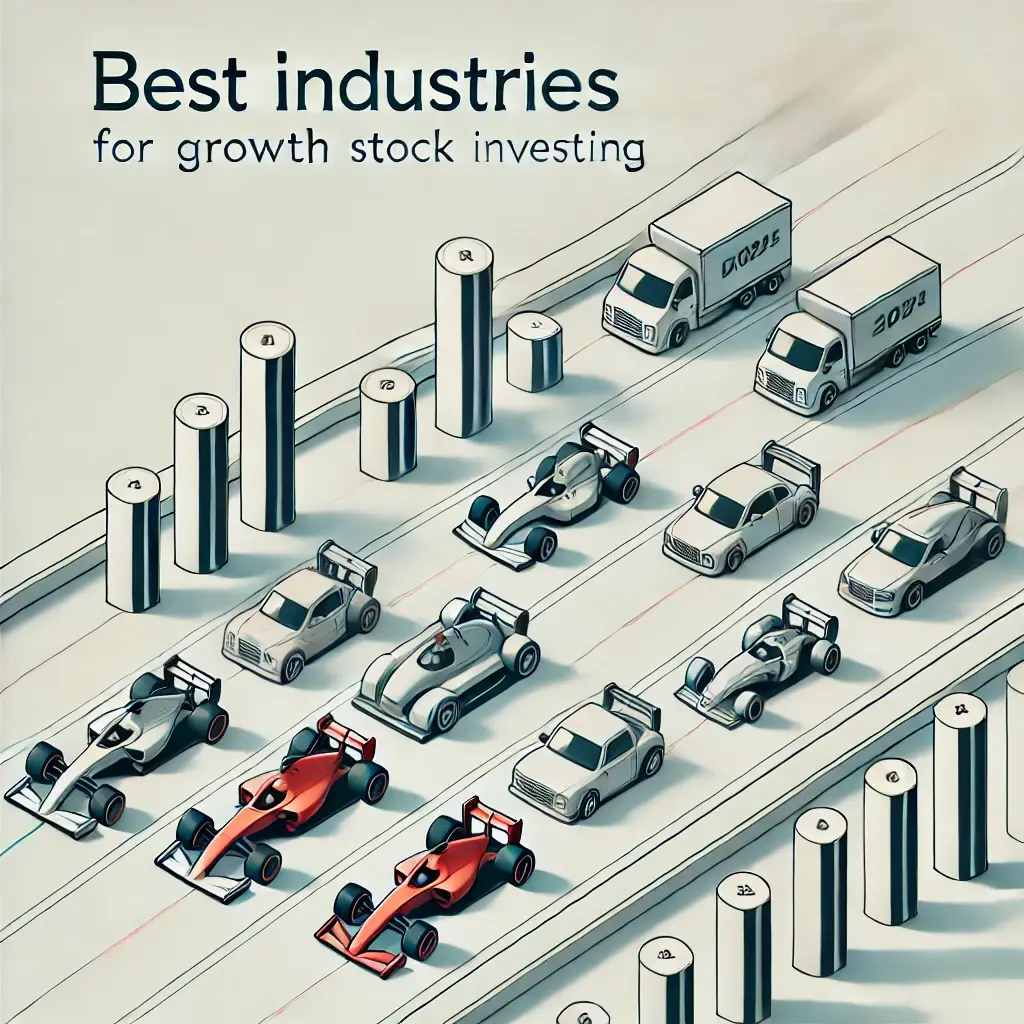
Best Industries for Growth Stock Investing in 2024
Stock Market Fundamentals | over 1 year ago

Top Growth Stocks to Watch in 2024
Stock Market Fundamentals | over 1 year ago
Frequently Asked Questions
What are growth stocks?
Growth stocks are shares of companies expected to grow faster than the average company in the market. These companies often reinvest their profits into expanding their business, developing new products, or entering new markets, rather than paying dividends.
Why do investors choose growth stocks?
Investors are attracted to growth stocks because of their potential for significant capital appreciation. These stocks have the potential to increase in value much more than the overall market, offering higher returns over time.
What sectors are growth stocks typically found in?
Growth stocks are often found in sectors with high potential for innovation and expansion, such as technology, healthcare, and consumer goods. These sectors are known for rapid changes and developments, driving the growth of the companies within them.
What is a high price-to-earnings (P/E) ratio, and why do growth stocks have it?
The P/E ratio measures a company’s current stock price relative to its earnings per share. Growth stocks usually have higher P/E ratios because investors are willing to pay more for the expected future growth, even if current earnings are lower.
How do growth stocks differ from value stocks?
Growth Stocks: Focus on companies expected to grow rapidly, often with high P/E ratios and little to no dividend payouts. Value Stocks: Focus on companies that are undervalued by the market, typically with lower P/E ratios and more stable earnings.
What are the risks associated with growth stocks?
Growth stocks tend to be more volatile and carry higher risk. If the company doesn’t meet growth expectations, its stock price can drop significantly. Additionally, these stocks are more sensitive to market conditions and economic changes.
Do growth stocks pay dividends?
Most growth stocks do not pay dividends, as companies prefer to reinvest their earnings into the business to fuel further growth. Investors in growth stocks typically seek capital appreciation rather than income from dividends.
Who should invest in growth stocks?
Growth stocks are suitable for investors with a higher risk tolerance and a long-term investment horizon. These investors are typically looking for significant growth in their portfolio and are willing to accept short-term volatility.
How can you identify a growth stock?
Growth stocks can be identified by looking at a company’s historical growth rates, future earnings projections, innovation potential, and the industry it operates in. High P/E ratios and strong revenue growth are also common indicators.
Can growth stocks be part of a diversified portfolio?
Yes, growth stocks can be an important part of a diversified portfolio, especially for investors seeking higher returns. Balancing growth stocks with more stable investments, like bonds or value stocks, can help manage risk.
What role do market conditions play in the performance of growth stocks?
Growth stocks tend to perform well in a strong economy when consumer spending is high and companies can expand easily. However, they may underperform during economic downturns or periods of market uncertainty due to their higher risk profile.
How long should you hold growth stocks?
Growth stocks are typically held for the long term, as their value is expected to increase significantly over time. Investors should be prepared to ride out short-term volatility to realize the potential gains.
Explore Growth Stocks


